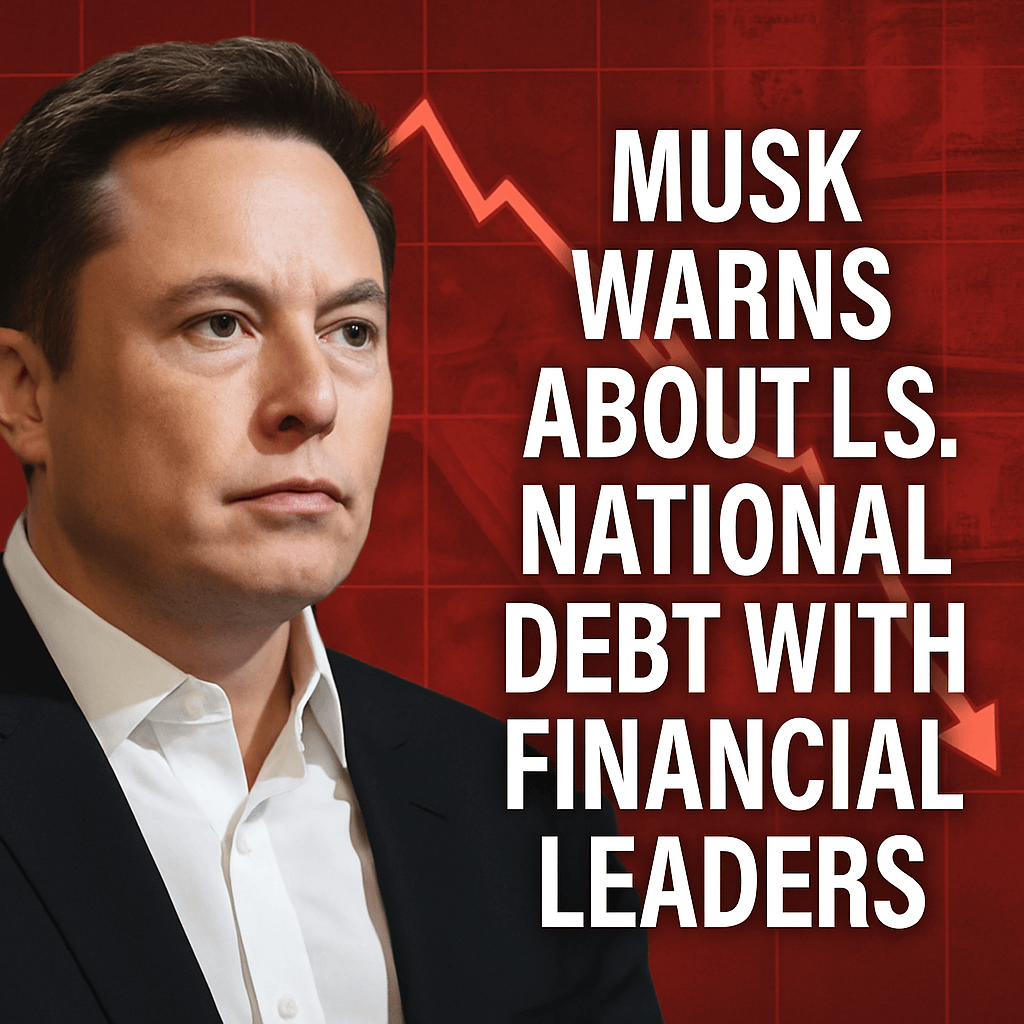Musk Warns About U.S. National Debt with Financial Leaders

Elon Musk, the CEO of Tesla and SpaceX, has publicly distanced himself from former President Donald Trump over a contentious Congressional spending bill, labeling it as fiscally irresponsible. Musk’s assertions come at a critical juncture in U.S. fiscal policy, reflecting broader concerns about the surging national debt, which currently stands at a staggering $32.6 trillion.
Musk’s Strong Discontent with Congressional Spending
During a recent outburst on social media platform X, Musk decried Trump’s “big, beautiful bill” as a “massive, outrageous, pork-filled Congressional spending bill” aimed at enacting what Trump described as the “largest tax cuts in history.” Musk’s frustration is compounded by his previously established Department of Government Efficiency (DOGE), which he spearheaded to reduce the annual budget deficit and, by extension, curb the federal deficit.
The administration claims that the spending bill will promote long-term GDP growth of 2.6% to 3.2% and increase take-home pay for median-income households by $5,000 annually. However, independent financial analysts have challenged these claims, estimating that the legislation could add approximately $3.8 trillion to the already burgeoning deficit. This is juxtaposed against potential cuts to Medicaid, projected to yield only $1 trillion in savings.
Escalating Concerns About National Debt
Musk’s critiques extended to claims that this spending bill would exacerbate the budget deficit, predicting an increase of up to $2.5 trillion, which could lead to the kind of burdensome debt that potentially envelops American citizens in “debt slavery.” In his opinion, the reliance on substantial government borrowing is a direct pathway to financial instability.
Musk stated: “Interest payments already consume 25% of all government revenue. If the massive deficit spending continues, there will only be money for interest payments and nothing else! No social security, no medical, no defense… nothing.”
Echoes from the Financial Elite
Musk’s concerns resonate with a cadre of influential financial leaders. Jamie Dimon, the CEO of JPMorgan Chase, warned during the Reagan National Economic Forum that the bond market could face a significant reckoning due to excessive spending and quantitative easing policies. Dimon has expressed uncertainty over when this crisis might occur, forecasting either a six-month or six-year timeline for an economic backlash so severe that it could necessitate a shift in fiscal policy.
Similarly, Federal Reserve Chair Jerome Powell emphasized the importance of returning to a sustainable fiscal path. He urged Congress to engage in a mature dialogue about fiscal responsibility, noting that rising national debt could have catastrophic implications for economic growth and the ability to service existing obligations.
Ray Dalio, founder of Bridgewater Associates, projected dire consequences if the U.S. cannot find buyers for its escalating debt. He explained that the U.S. faces noticeable fiscal limitations if it experiences a scenario where “the world does not want to buy” additional debt, which could result in unwanted inflationary pressures and deteriorating investor confidence.
Warren Buffett, the CEO of Berkshire Hathaway, deemed the current fiscal deficit “unsustainable over a very long period” and hinted at a potentially imminent reckoning for government fiscal policy. Buffett’s critique underscores the complexity of correcting entrenched fiscal mismanagement, given the historical context of other nations that faced severe outcomes from similar patterns of spending.
Assessment of the U.S. Debt-to-GDP Ratio
The real issue plaguing the U.S. economy is not merely the sheer size of the national debt but its growing ratio to GDP, a critical metric utilized by economists to gauge fiscal health. As it stands, the Congressional Budget Office anticipates that the debt-to-GDP ratio could reach 156% by the year 2055. Such figures prompt serious questions regarding whether the U.S. economy is expanding swiftly enough to manage both existing debt and future borrowing needs.
Future Implications and Expert Opinions
Professor Joao Gomes from Wharton Business School highlighted that the critical factor concerning national debt is the availability of buyers for that debt. With traditional investors such as China and Japan reducing their holdings, the risk of higher interest rates becomes increasingly relevant.
As the national debt situation continues to escalate, a fundamental question arises: Can the U.S. sustain this trajectory without triggering a larger economic crisis? Opinions vary, but experts agree on the necessity for immediate action to stabilize fiscal policy.
Conclusion: A Call for Fiscal Responsibility
The recent rhetoric from Musk and other financial leaders emphasizes an urgent call for fiscal responsibility and a reassessment of U.S. spending habits. With national debt at an unprecedented scale, the implications of continued overspending could have lasting ramifications for future generations. As debates continue regarding the appropriate path forward, policymakers will face mounting pressure to establish a sustainable financial framework that encourages economic growth while reducing reliance on excessive government borrowing.
Source: fortune